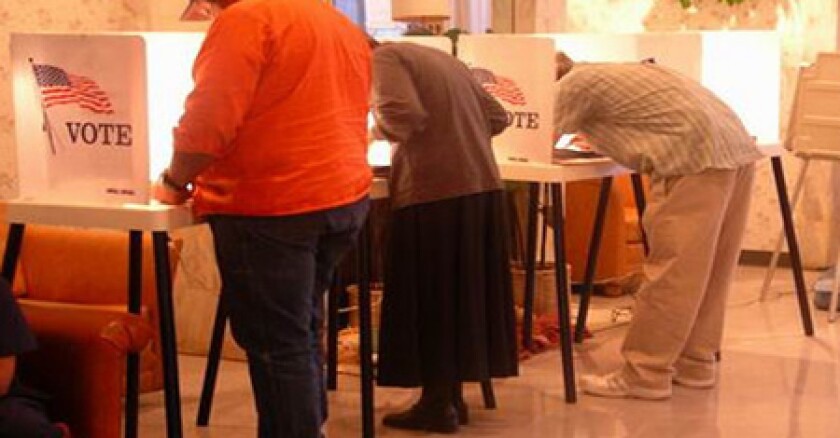To Klutz, the plans are perplexing, since turnout in the 2012 presidential election is expected to be almost 90 percent higher than that of this year’s municipal election, in which the biggest race on the ballot is for mayor of Fort Wayne. “We can’t conduct a full election like that,” says Klutz. “I don’t know what to do.”
For now, the office is pleading with the county to provide $90,000 more than what’s already been allocated, even though that's still well-below what the office says it needs to run the 2012 election. With those extra funds, election officials would still use 200 fewer machines and 240 fewer poll workers than what they say is really needed. “I’m all for cutting government spending,” says Klutz. “But there has to be a responsible balance between cutting government spending and conducting duties that are necessary in a democratic society.”
As states and localities struggle with decreased revenue, elections offices haven’t been spared from budget cuts. Across the country, state and local election officials say they’re anxious about an almost inevitable increase in problems at the polls during the presidential election scheduled for Nov. 6, 2012. More than 40 percent of respondents to a National Association of Elections Officials (aka the Election Center) survey said their budgets are down at least 10 percent from their peak. With state and local governments making system-wide cuts, elections departments aren't unique in that regard.
But unlike many other government offices, the work of elections departments can’t be postponed. As unpleasant as it may be, a transportation department can delay filling a pothole for a year. A school district could delay building a new school. But regardless of a localities’ financial situation, an election can’t be put on hiatus due to budget constraints. “The difference is voting is very public,” says Doug Lewis, executive director of the Election Center. “It’s very visible. [The election] is going to happen whether you want it or not. And if it fails, everybody that’s in authority gets to suffer.
Elections officials say historically, they’ve been underfunded by lawmakers who only see their work one day a year – if that often – but they’ve managed to make do. But now, elections offices are bracing for what could be an ugly 2012 election, when several years of cuts manifest themselves in the form of complications at the polls.
“It’s sort of what I call the perfect storm,” Lewis says. “You contract, contract, contract, and now you explode the number of people you need to serve in what may be a very contentious election cycle.”
Local elections administrators, under the pressure of budget cuts, are most likely to try to save money by cutting “soft expenses” like voter education and training for poll workers, says Kay Stimson, communications and special projects director at the National Association of Secretaries of State. Meanwhile, more and more entities are struggling under the expense of the high-tech machines they began purchasing after the 2000 election with the aid of federal funds. But that money is drying up; many of those machines are more than a decade old and in need of expensive maintenance that states and localities can’t afford. That means there will be fewer machines at each polling site. Voters can also expect to see fewer polling places and shorter early-voting periods than what they’re used to says Doug Chapin, who leads the election administration program at the University of Minnesota's Humphrey School of Public Affairs.
In some places, county elections departments are so underfunded that even in a medium-sized jurisdiction, there is only one person with the know-how to run an election. “What if that one person gets sick or has some other serious problem occur?” says Sam Reed, the Republican secretary of state in
Still, elections officials are trying to make do. Chapin says that the budget challenges have presented an opportunity for administrators to find creative ways to save money. A growing number of jurisdictions are turning to online voter registration, which is more efficient than the mail-in process. They’re also using voting centers, which are polling sites that allow voters from multiple districts to cast ballots. The consolidation could save some localities money, and it may be more convenient for voters to cast ballots at sites near their jobs as opposed to their homes.
In some cases, states are taking extreme steps. In May,
In at least one incidence, the cost of an election has influenced local policy. Earlier this year Port Orchard,
Despite the nationwide anxiety of election leaders, there is a silver lining, says Brad King, the co-director of the Indiana Elections Division. The record-setting 2008 elections gave them some experience with the high turnout they can expect. Meanwhile, Lewis says election officials know “failure is not an option.” But if things get ugly, he won’t be surprised. “As we tend to say in the elections business: if you think the cost of a good election is expensive, wait until you have a bad one.”









